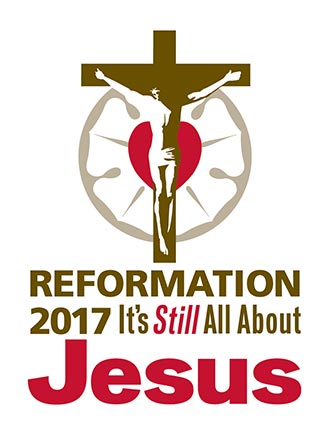What’s
the Reformation all about? It’s still
all about Jesus. It’s that simple. Not Martin Luther. Not Philip Melanchthon.
Not the name “Lutheran,” to which we gladly cling as a distinctive and
clarifying label. It’s all about Jesus — not merely as example but as Savior,
the Father’s only provision for sin.
Melanchthon
crystallizes the pressing issue of the Reformation clearly in the Apology
(XXVII), where suddenly, in the middle of his writing, he erupts with a
petition to Jesus:
O
Christ, how long will you endure these insults which our enemies heap upon your
gospel! In the [Augsburg] Confession we said that the forgiveness of sins is
received freely on account of Christ through faith. If this is not the very
voice of the gospel, if it is not the statement of the eternal Father, which
you, who are “close to the Father’s heart” (John 1:18), have revealed to the
world, then the charge against us is true. But your death is a witness, your
resurrection is a witness, the Holy Spirit is a witness ...
The
Reformation is about the sweet Gospel in Christ — a free, clear gift, apart
from any human effort.
Plan
now to join the celebration of the Reformation’s 500th anniversary.
Please
visit the newly launched LutheranReformation.org
website. There, you’ll find free downloadable resources, a hymn competition and
more. Additional resources are on the way.

2 comments:
In the Lutheran Reformation webpage, "What is a Lutheran?":
What are the Smalcald Articles and the Treatise on the Power and Primacy of the Pope?
In 1537, Martin Luther was asked to prepare a statement of Lutheran belief for use at a church council, if it was called. Luther’s bold and vigorous confession of faith was later incorporated into the Book of Concord. It was presented to a group of Lutheran rulers meeting in the town of Smalcald.
Huh? "In 1537..."?!?
According to F. Bente's Historical Introduction to the Lutheran Confessions:
"Luther had received the order to draw up these articles as early as August 20, 1536. September 3 Brueck wrote to the Elector on this matter: “I also delivered to Doctor Martin the credentials which Your Electoral Grace gave to me, and thereupon also spoke with him in accordance with the command of Your Electoral Grace.He promised to be obedient in every way. It also appears to me that he already has the work well in hand, to open his heart to Your Electoral Grace on religion, which is to be, as it were, his testament.” (p. 242)
"It was presented to a group of Lutheran rulers meeting in the town of Smalcald."
What?!? From Bente:
"[I]t cannot be proved that he directly and expressly mentioned them or submitted them for discussion and adoption." (p. 244)
"According to this report [of the Strassburgers], then, Luther’s articles were neither discussed nor adopted at the official meeting of the princes and estates belonging to the Smalcald League." (p. 246)
"As to the articles of Luther, Veit Dietrich reports that they were privately circulated at Smalcald and read by all. They were also to be read at the meeting of the theologians on February 18. (C. R. 3, 371.) As a matter of fact, however, neither a public reading nor a real discussion, nor an official adoption resulted." (p. 247)
"Luther’s articles, however,were nevertheless adopted at Smalcald, though not by the South Germans. When all other business had been transacted, they were presented for voluntary subscription. Bugenhagen had called the theologians together for this purpose. He proposed that now all those who wished (qui velint) should sign the articles Luther had brought with him. Hereupon Bucer declared that he had no commission to do this. (p. 247)
"Although, therefore, the subscription of the Smalcald Articles lacked the official character and was not by order of the Smalcald League as such, it nevertheless is in keeping with the actual facts when the Formula of Concord refers to Luther’s Articles as “subscribed at that time [1537] by the chief theologians.” (p. 248)
The correct 1536 date has now been put into the "What is a Lutheran?" webpage and the "Frequently Asked Questions about the Book of Concord" webpage (although the three downloadable files still have the incorrect 1537 date).
And the other noted historical error in those webpages is still present. Maybe it will be correct this week.
Post a Comment